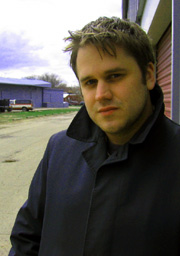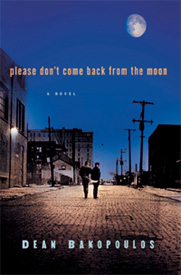- Categories:
Debut Novel's Success Puts Former Bookseller Over the Moon
 photo by Amanda Okopski |
Former bookseller and first-time author Dean Bakopoulos (Please Don't Come Back From the Moon, Harcourt) isn't ashamed to admit he might know something about recent spikes in BookWeb traffic statistics: "When I found out I made the February Book Sense Picks list, I was thrilled. There's fierce competition; the best-read people in America are picking their favorite books," he said. And, he added, "I'd be lying if I didn't say I was obsessively checking the BookWeb site every week, waiting for the list to be published."
Bakopoulos is no stranger to Book Sense; he worked for several years as buyer and events-director for the now-closed Canterbury Booksellers Coffeehouse Inn in Madison, Wisconsin. "Handselling was what I loved to do there.... It's the most gratifying part of the job. Independent bookstores are full of great customers who love to be told what should be on their radar screens. It was gratifying to be there for the start of Book Sense -- it's a great way to handsell," he said.
And if he were trying to handsell his own book? "I would say it's sad and comic, surreal and gritty and dark."
These elements indeed abound in Please Don't Come Back From the Moon, a unique and affecting tale buoyed by undercurrents of sadness and hilarity, mystery and magic.
The story begins during narrator Michael Smolij's 16th summer -- a summer when, one after another, the fathers of suburban Maple Rock (a fictional Detroit suburb) disappear. One man leaves a note that says, "I'm going to the moon. I took the cash."
Left with no other information, those who are left behind half-believe the celestial explanation ... and react in ways that are a testament to Bakopoulos' wit and imagination: the women belly up to the bars their husbands used to patronize, even engaging in a parking-lot brawl or two. Michael and his friends try to act like men, taking full-time jobs and trying to find a stable ground between boyhood and manhood.
 Bakopoulos' depiction of the new, often fraught dynamics of the broken Smolij family is an affecting one, realistic in both its drama and its comedy. So, too, are Michael's uncertain longings for something more than what can be found within the boundaries of his neighborhood. The college-town of Ann Arbor is depicted as a place that is geographically near but socially far, filled with people that are at once repellent and fascinating to Michael.
Bakopoulos' depiction of the new, often fraught dynamics of the broken Smolij family is an affecting one, realistic in both its drama and its comedy. So, too, are Michael's uncertain longings for something more than what can be found within the boundaries of his neighborhood. The college-town of Ann Arbor is depicted as a place that is geographically near but socially far, filled with people that are at once repellent and fascinating to Michael.
The author said he experienced a similar cultural divide while growing up outside of Detroit. "Maple Rock is based on several different neighborhoods. I went to school in the suburbs, and was probably the only one in my crowd closely tied to the immigrant experience.... We drove to Detroit to go to the Ukrainian church, and ate Ukrainian food."
And, he added, "Ann Arbor was a magical place to me ... where I lived, I never met a writer or artist or musician, but Ann Arbor was full of bookstores, cafes, and live music. I couldn't figure out what appealed to me, or how to get into that community."
Clearly, he succeeded, but not without some soul-searching: "I remember the first reading I went to, at Shaman Drum in Ann Arbor. They had wine and cheese after, and I felt like a rube. At the time I thought everything about academia and art was elitist, and then I realized it was just different.... I wanted to be a part of something and resented it because I wasn't."
And, he added, "Now that I'm in that world, I'm really trying to remember what it was like. For a while, I hated people like me because they were doing something I wanted to do. Similarly, at Canterbury, it was important to make it a friendly store. It had a reputation of being a little snooty, simply because it was a beautiful place with a lot of books. We made sure staff made people feel welcome, and that no question was a dumb question."
Bakopoulos was working at Canterbury when Please Don't Come Back From the Moon was born as a short story, published in Zoetrope: All-Story magazine. "I was 24 when the story was published. Suddenly, agents were calling me at the bookstore.... I'd run into my closet-like office and lie to everyone, telling them I was almost done with a novel," Bakopoulos said.
Then, panicked that he wouldn't be able to write a novel, he went to the Vermont Studio Center on a month-long fellowship. "I wrote a 250-page novel I thought was so good, but it's just awful. Then I got back to the office and all the hard work that goes into running a bookstore, and realized I couldn't finish a novel while working full-time, so I decided to go to grad school."
Before enrolling in an MFA program, though, Bakopoulos took a year-long appointment as founding director of the Wisconsin Book Festival and now, post-MFA, he serves as executive director of the Wisconsin Humanities Council.
There, he oversees programs such as the Book Festival, literacy initiatives, and "programs throughout the state that help bring culture and interesting public programming to areas that might not otherwise get it based on geography or economics." He added, "I love to do public programs, to do something somewhat activist in nature -- it makes the world a better place to live, and satisfies in me things that writing might not."
When Bakopoulos isn't working, he writes: a collection of three novellas is in the works, in addition to a new novel. "I love the novella form," the author noted. "I find I can't write short stories anymore ... the novella allows you to not commit to the novel, but you can spend a long time with the characters. It's a little more leisurely and allows for digression."
Next up is an 11-city author tour, beginning this month with Midwest cities, and then moving to the East Coast (check http://www.deanbakopoulos.com for details). "The first appearance will be before a hometown crowd, so I won't read the sex scene," he said, laughing. "I'm trying to pick a chapter that won't make me squeamish in front of the neighbors' kids."
Bakopoulos' bookselling background will come in handy in terms of managing expectations for the tour, he said, noting, "I know what to expect ... if I'm in a situation where I feel people have read the story, I'll pick something further on in the book. If I'm reading to three people passed out in the back of the store, I'll read the beginning of the novel."
He added, "If anyone shows up for an event about books, it's great, especially with all the things you're competing against ... the economy, people working day and night, getting a babysitter is a luxury. I spent a lot of my paychecks from Canterbury buying drinks for disappointed writers."
Fortunately, Bakopoulos didn't allow disappointment to deter him from writing Please Don't Come Back From the Moon despite the initial rejections he received when he first submitted to publishers a short-story collection (including the story that later became the novel).
Rather, he said, he took to heart one letter that was "very blunt, but very encouraging.... It got me all charged up to say if one editor will read this when I'm done, I owe it to myself to try to write. It took five years to finish."
That same editor bought the book for Harcourt, and "it's a dream come true," Bakopoulos said. "I know from working in the book business how many great books are published each year that don't get attention from publishers, that aren't Book Sense Picks." --Linda Castellitto

